Amazon’s success as a leading ecommerce platform is driven by its relentless focus on delivering a seamless and reliable user experience. Behind every product search, page load, and checkout flow is a robust layer of software testing services, automation testing tools, and usability testing practices.
With AI software testing and real-time quality assurance strategies, Amazon ensures its ecommerce websites meet the highest usability and speed standards. Whether through website performance testing or automated UX testing, Amazon sets the benchmark for ecommerce quality. This guide explores how software testing enhances a seamless digital experience.

💡 Amazon’s Software Testing Overview – Key Takeaways
📌 Agile Testing Strategy: Combines agile, shift-left, and continuous testing for faster, more reliable releases.
📌 Scalable Infrastructure: Powered by AWS Lambda, EC2, and top automation tools for global testing efficiency.
📌 Performance Testing: Uses JMeter, API, and Gatling load testing to ensure stability during high-traffic events.
📌 UX Optimization: Focuses on automated UX testing, CX testing, and real-user feedback for better engagement.
📌 Security Validation: Detects threats like XSS, SQL Injection, and Session Hijacking to protect e-commerce data.
Introduction to E-Commerce Ecosystem
Amazon has built one of the most advanced ecommerce ecosystems in the world, setting the standard for ecommerce websites across the globe. As a leading ecommerce platform, Amazon combines innovation, scale, and technology to create a seamless online shopping experience. From product discovery to personalized recommendations, every aspect of the user journey is backed by powerful software testing tools and performance testing strategies.
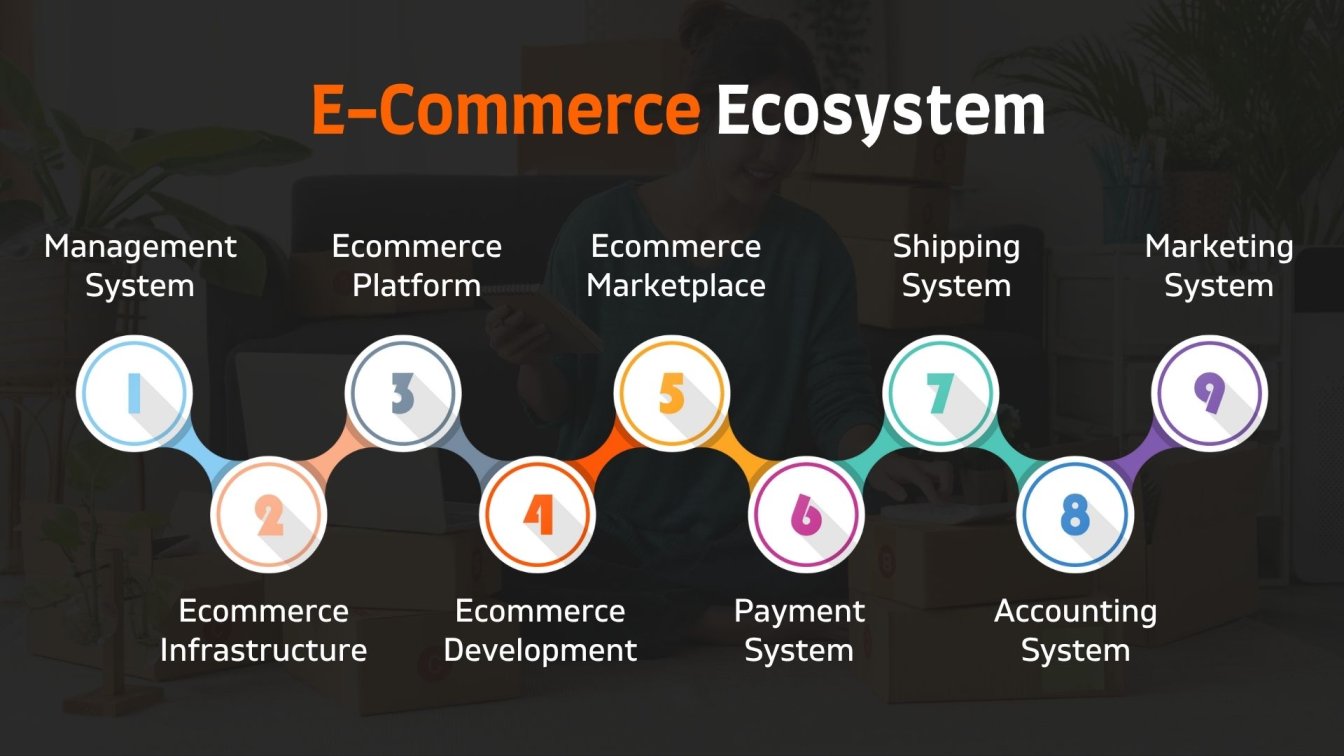
With support from Amazon AWS infrastructure and automation testing services, the platform maintains high availability, speed, and security across millions of transactions. By leveraging usability testing services and software quality assurance testing services, Amazon ensures its ecosystem delivers consistent, user-centric performance. This introduction examines the key factors that drive Amazon’s dominance in the e-commerce landscape.
Why User Experience Matters in E-Commerce
In today’s competitive e-commerce landscape, delivering a seamless and intuitive user experience is essential for building trust, increasing conversions, and retaining customers. A well-optimized UX not only enhances customer satisfaction but also directly impacts the performance and success of your ecommerce website.

- Using ux testing tools and user testing ux methods helps identify friction points and optimize user journeys.
- Automated UX testing ensures the scalable and rapid validation of design changes.
- Usability testing fix reveals how real users interact with your ecommerce platform.
- Load testing software helps evaluate how UX holds up under high-traffic conditions.
- Implementing website performance testing tools boosts speed and responsiveness.
- Top ecommerce platforms rely on ux testing services to continuously improve customer experience.
Amazon’s Approach to Delivering a Seamless User Experience
Delivering a flawless user experience at scale, Amazon combines automation, performance testing, and data-driven strategies across its ecommerce platform. This approach ensures consistency, speed, and customer satisfaction across every digital touchpoint.
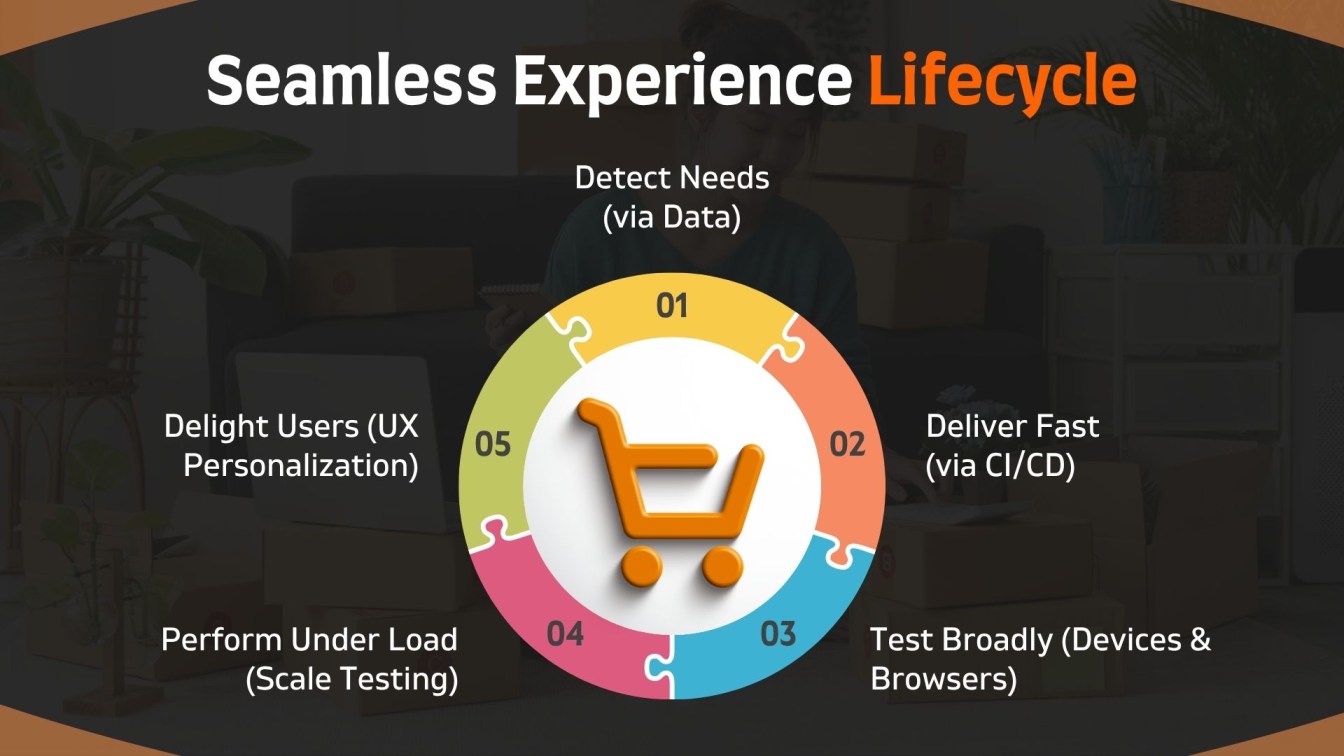
Personalization Through Data-Driven UX
Amazon tailors every interaction using real-time user data, ensuring intuitive navigation, relevant suggestions, and consistent engagement across the ecommerce platform.
Automated Testing at Scale
Amazon uses sophisticated regression testing techniques and automated testing tools to find problems early and keep user journeys faultless during millions of transactions.
Cross-Browser and Device Compatibility
Through rigorous cross-browser testing and cross-platform compatibility checks, Amazon delivers consistent experiences across all devices and browsers.
Performance Optimization with JMeter
Using JMeter load testing, Amazon ensures its ecommerce websites remain responsive even under high traffic, maintaining high-quality UX performance.
Continuous Delivery with AWS and CI/CD
Built on Amazon Web Services and a mature CI/CD pipeline, Amazon rapidly deploys updates without compromising user experience or functionality.
The Importance of Software Testing in E-Commerce
In the fast-paced world of ecommerce, delivering a reliable and user-friendly experience is non-negotiable. Software testing plays a critical role in ensuring that every ecommerce website functions smoothly across devices, browsers, and platforms. Through a combination of manual testing, functional testing, and integration testing, businesses can validate key workflows like product search, checkout, and payment gateway transactions.
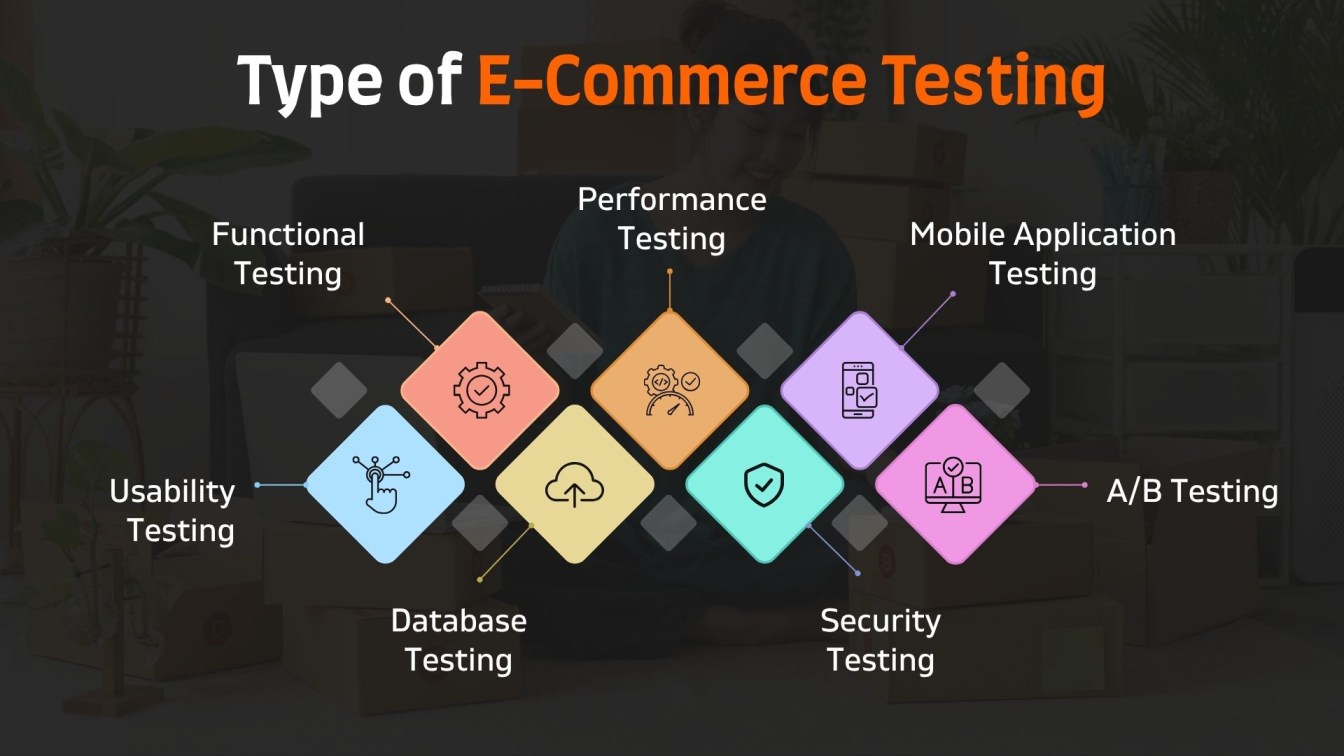
Leading platforms like Amazon rely on automated testing, regression testing, and compatibility testing to catch bugs before they impact users. Tools like JMeter load testing and automated testing tools help evaluate site speed, especially under peak traffic. Incorporating API testing and cross-browser testing ensures flawless operations across touchpoints. Additionally, with robust security measures in place, companies can safeguard user data. Integrating testing into the CI/CD pipeline ensures continuous delivery and stable releases. Ultimately, software testing supports better UX, higher conversions, and trustworthy ecommerce platforms at scale.
Amazon’s Software Testing Strategy
Amazon’s software testing strategy is designed to ensure reliability, scalability, and customer satisfaction across its massive e-commerce website. By combining agile principles with automation, performance evaluation, and real-time analytics tools, Amazon delivers seamless digital experiences at scale. Testing is tightly integrated into its CI/CD pipeline, enabling rapid releases while maintaining functional stability.
With support from AWS services like AWS Lambda and AWS EC2, Amazon’s infrastructure allows flexible and high-speed deployments. From security testing to API load testing, every test scenario is crafted to prevent failures in critical areas such as the payment process, search functionality, and logistics operations.
Agile and Continuous Testing Culture
Amazon embraces agile testing by involving QA teams early in development. Testers define user-centric test cases and execute frequent iterations, aided by AI-powered insights and CX testing. Continuous testing ensures stability across browsers and devices, supported by Cross-Browser and Device Testing practices.

Shift-Left Testing and DevOps Integration
Using the AWS Management Console, developers automate deployments and trigger tests through scalable infrastructure. Embracing shift-left testing, Amazon integrates quality checks early in the development lifecycle to detect issues before they escalate. Security testing includes threats like XSS attacks, SQL Injection, Session Hijacking, and Cross-Site Request Forgery. Load is monitored with Gatling load testing and API load testing, ensuring peak performance and minimal network latency.
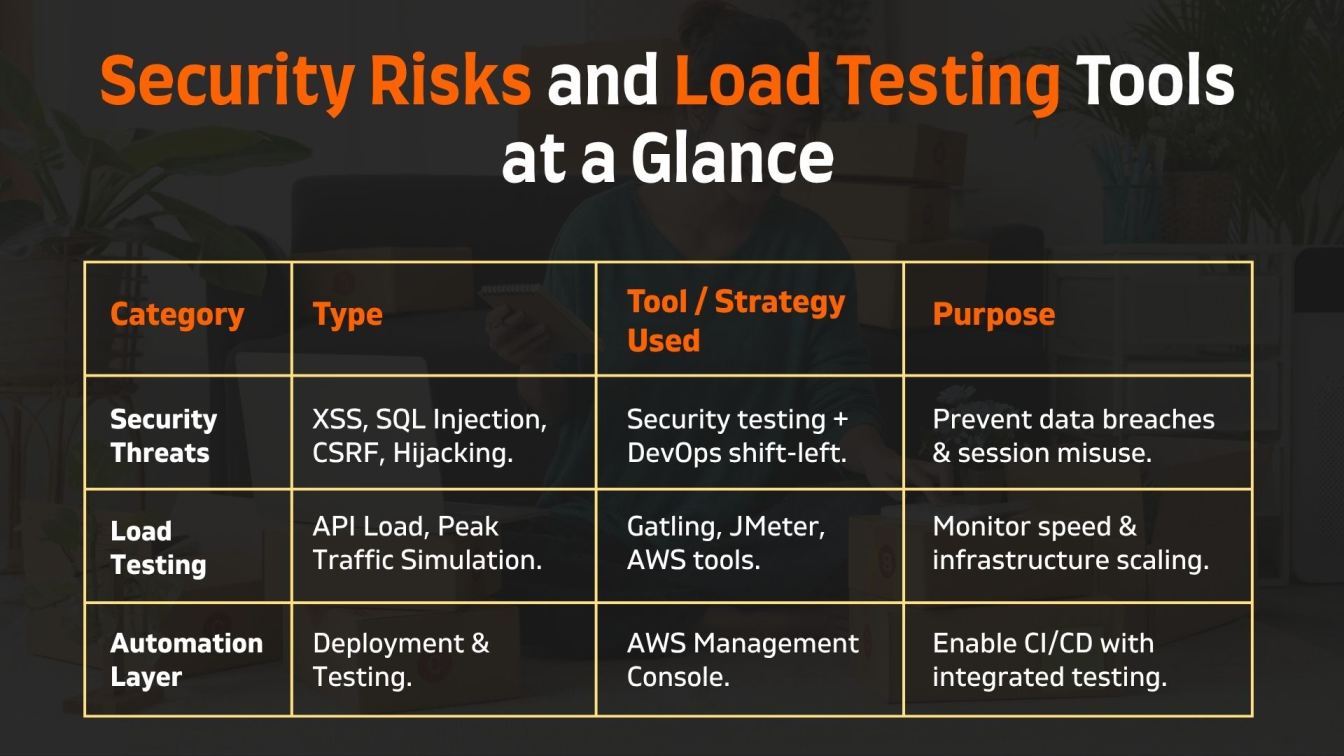
Functional Testing for Flawless Customer Journeys
Functional testing is essential for ensuring that every step of the customer journey on an ecommerce website works exactly as expected. Amazon conducts rigorous functional testing across its platform to validate core features such as search functionality, the payment process, product filters, and checkout workflows.
Testers create detailed test cases and execute real-world test scenarios to uncover defects before users do. To ensure a smooth omnichannel experience, Amazon also integrates Omnichannel Testing and Cross-Browser and Device Testing to deliver consistent functionality across platforms.
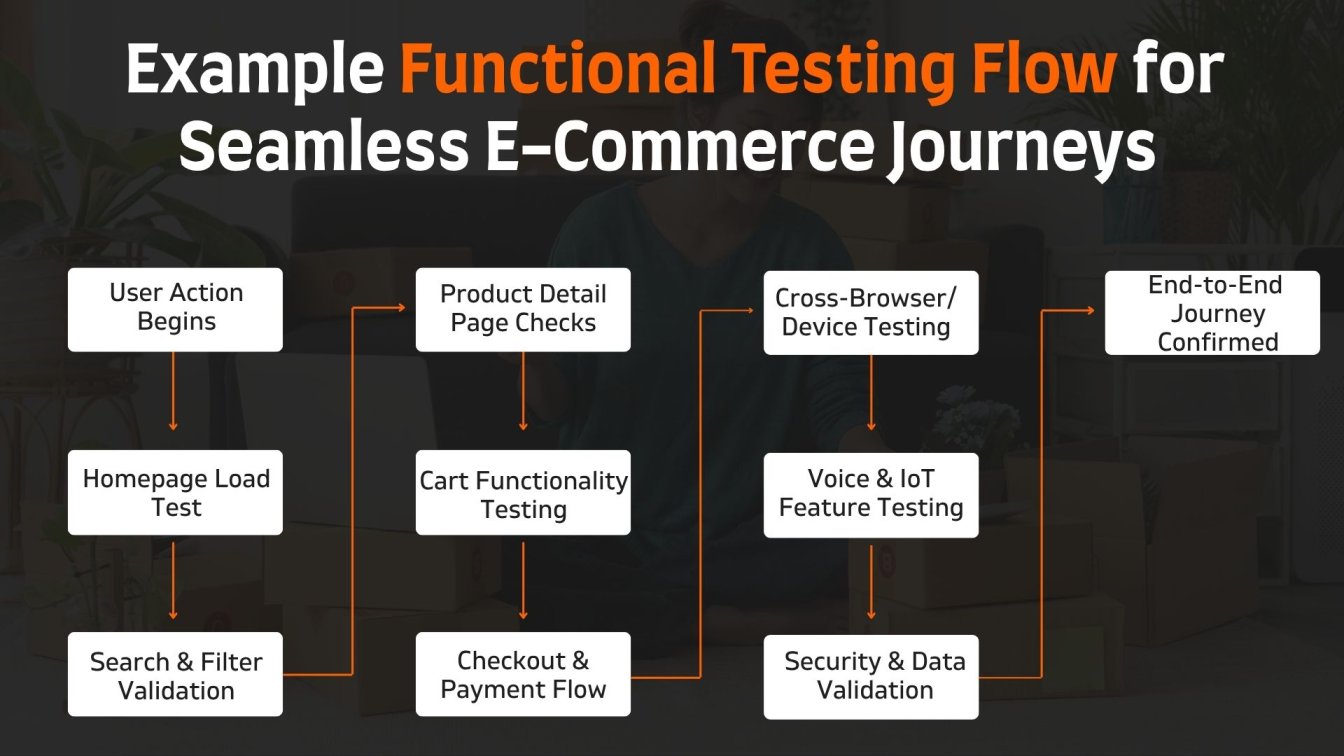
Features like Voice Interface Testing and IoT Testing are tested for growing accessibility demands. Functional stability is maintained through continuous testing supported by AWS Lambda, browser developer tools, and AI-powered insights. Security flaws like SQL Injection and Session Hijacking are also validated as part of broader security testing. These functional tests are key to delivering reliable, user-friendly digital shopping experiences at scale.
Performance Testing at Amazon Scale
Amazon handles millions of transactions daily, making performance testing critical to maintaining speed, reliability, and user satisfaction. The company uses powerful performance testing tools and a scalable infrastructure built on AWS EC2, AWS Lambda, and Content Delivery Networks to support global ecommerce traffic.
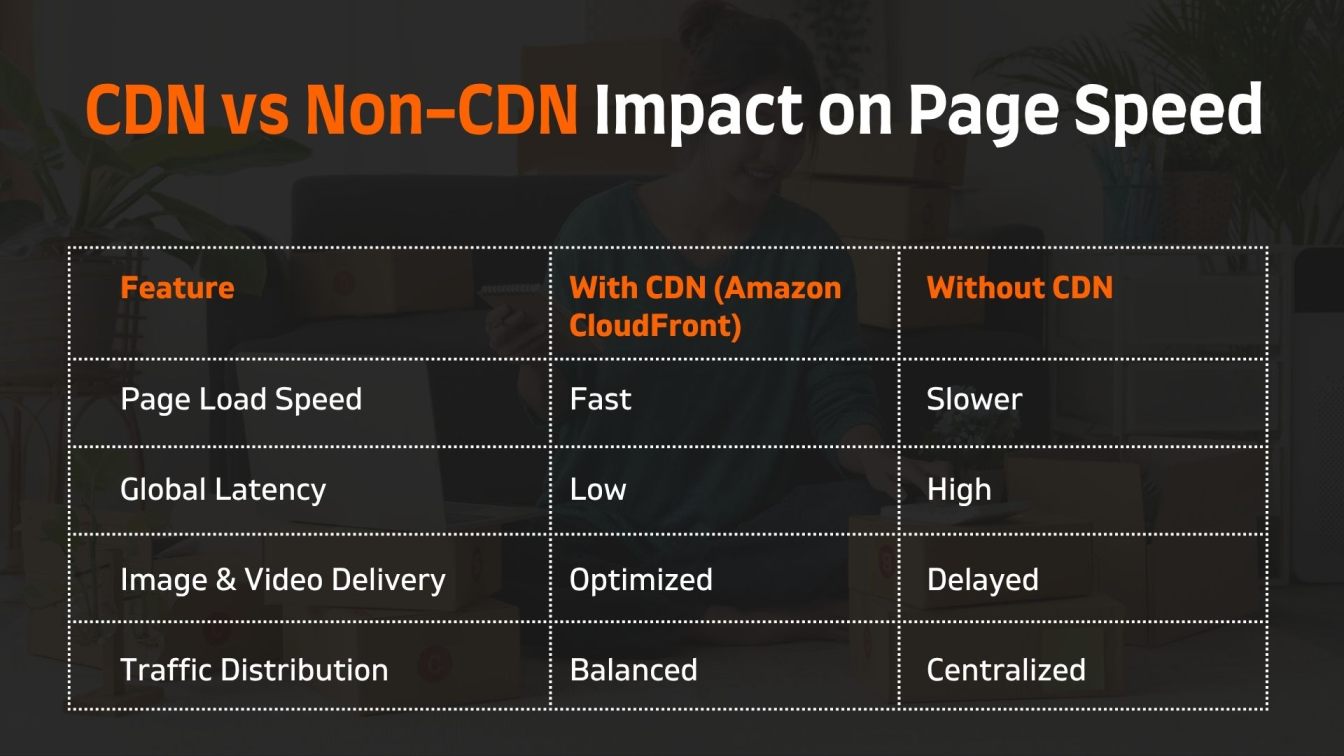
- JMeter load testing and Gatling load testing simulate real-world traffic during peak demand
- API load testing helps monitor backend performance across ecommerce operations
- Network latency and bottlenecks are identified using advanced analytics tools
- Cross-Browser and Device Testing ensures consistent speed across platforms
- Amazon integrates testing into its CI/CD pipeline for continuous performance evaluation
- AI-powered insights help prioritize fixes and optimize performance in real time
Automation Testing for Speed and Accuracy
Automation testing plays a crucial role in helping ecommerce giants like Amazon achieve speed, accuracy, and continuous delivery. By using advanced automation testing tools such as Selenium automation testing, Amazon ensures test execution across multiple environments without human intervention.
Automated scripts validate key functionalities like payment process, search functionality, and user flows on the ecommerce website, all while improving test coverage and reducing time to market.

Amazon leverages AI-powered insights and integrates automation into its CI/CD pipeline for seamless and rapid deployments. With support from API load testing the scalable infrastructure supports parallel test runs.
Automation is applied to functional, regression, and security testing, protecting against threats like Session Hijacking and Cross-Site Request Forgery. Combined with Cross-Browser and Device Testing, automation ensures accurate results across devices and platforms. This strategic use of automation enables Amazon to maintain high-quality customer experiences at scale while accelerating innovation.
Security and Compliance Testing in Amazon’s Workflow
Security and compliance are mission-critical in Amazon’s ecommerce operations. Through rigorous security testing and proactive monitoring, Amazon protects user data, payment processes, and infrastructure across its ecommerce website. Compliance testing ensures the platform adheres to global data protection standards and ecommerce regulations.

- Amazon mitigates vulnerabilities like SQL Injection, XSS attacks, and Cross-Site Request Forgery
- Automated scans run within the CI/CD pipeline for early detection and continuous protection
- Session Hijacking risks are reduced through encrypted sessions and access controls
- Configurations of secure infrastructure are managed via the AWS Management Console.
- Security validation is integrated into all test scenarios and test cases
- AI-powered insights help prioritize and patch emerging threats in real time
- Compliance checks ensure customer data and transactions meet international security standards
Cross-Browser and Cross-Device Compatibility Testing
To provide a smooth user experience across all platforms and devices, cross-browser and cross-device compatibility testing is crucial. For ecommerce giants like Amazon, ensuring that the ecommerce website functions consistently on every browser and device is critical to conversion and customer trust. Testers can find layout changes, broken elements, and performance problems in various situations by using ux testing tools, automated UX testing, and usability testing services.

Tools like automation testing services and usability testing ux help validate that core features such as the payment process, product filters, and navigation work flawlessly across Chrome, Firefox, Safari, and mobile platforms. Compatibility testing ensures functional stability, reduces bounce rates, and boosts customer satisfaction. Amazon integrates this process into its QA workflows to optimize its ecommerce platform and maintain a competitive edge in the digital retail space.
Usability Testing and Real User Feedback
Usability testing plays a vital role in enhancing the user experience of any ecommerce platform. Amazon invests heavily in usability testing tools and usability testing services to evaluate how real users interact with their ecommerce websites. With support from website usability testing services, Amazon gathers valuable feedback on layout clarity, ease of navigation, and the overall shopping experience.
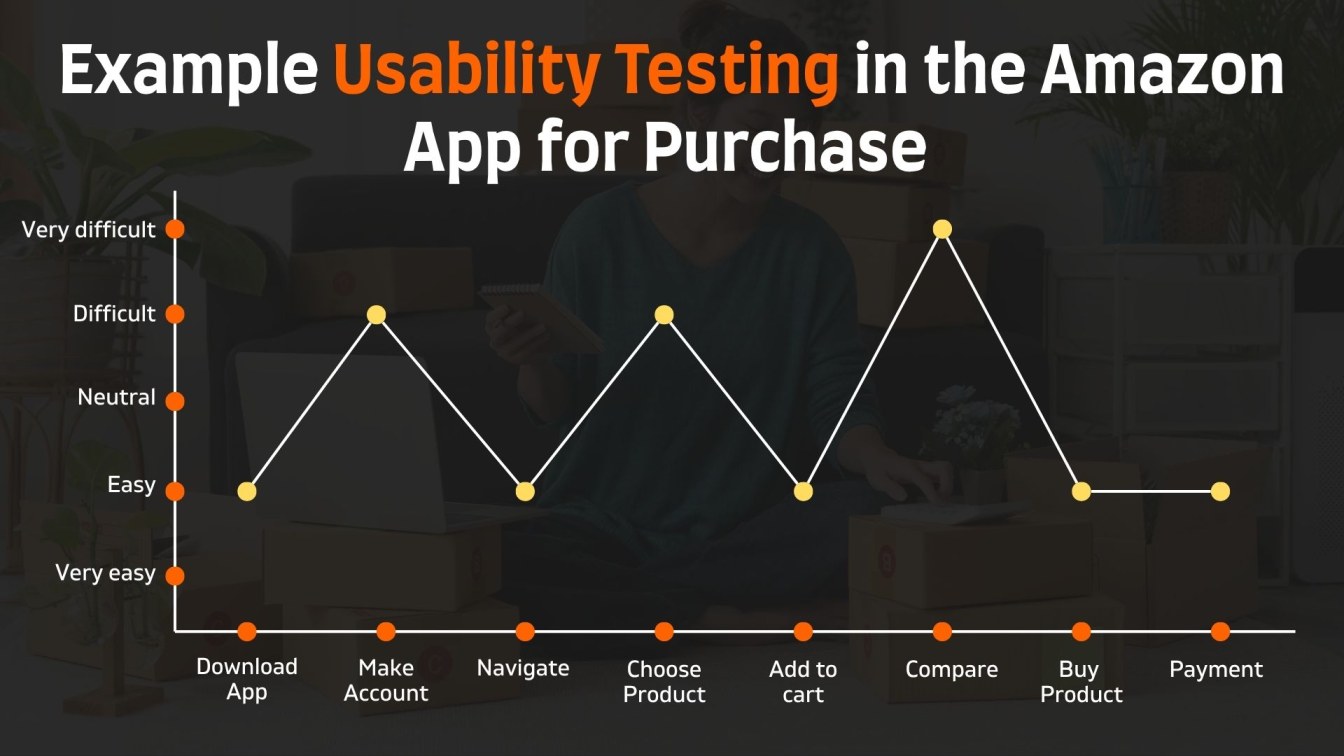
Real user insights help identify and fix issues that automated systems may overlook. Combined with UX testing, ux testing tools, and ux testing services, these practices allow Amazon to continuously improve customer satisfaction. The use of user testing, UX, and automated UX testing ensures that every update aligns with real-world expectations, leading to a smoother, more intuitive digital journey for all users.
The Future of Software Testing in E-Commerce
The future of software testing in e-commerce is being shaped by intelligent automation, enhanced user feedback loops, and highly secure, scalable infrastructure. As platforms like Amazon continue to grow, delivering seamless digital experiences across devices, channels, and technologies becomes essential. To achieve this, testing strategies are evolving to include advanced tools and insights that improve quality, speed, and trust.
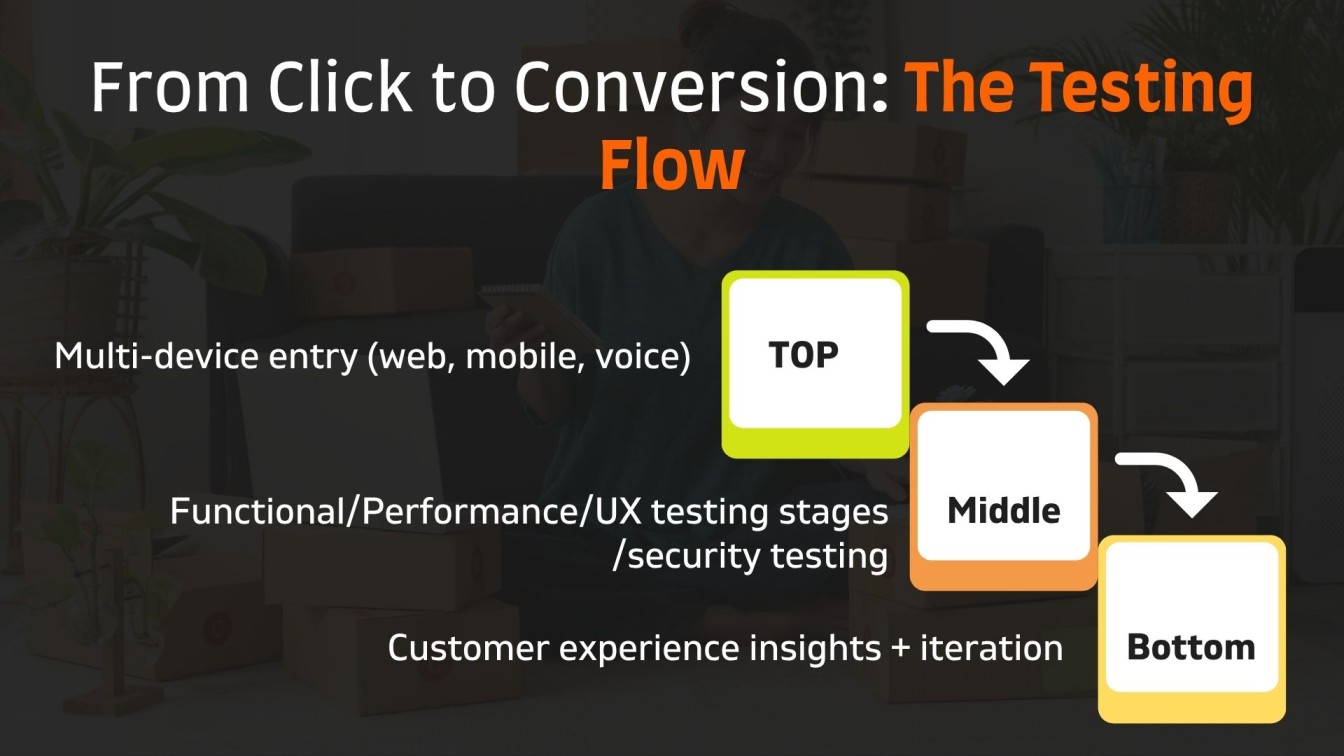
- AI-Powered Insights
Next-gen software testing leverages machine learning to create adaptive test scenarios, minimize manual effort, and accelerate defect detection in real time. - CX Testing
Future-focused testing prioritizes user satisfaction using real-time feedback and behavior tracking to personalize experiences across diverse ecommerce platforms. - Omnichannel Testing
As shopping spans multiple touchpoints, omnichannel testing will ensure consistent functionality and UX across mobile apps, web platforms, and in-store technologies. - Voice Interface Testing
With the rise of voice commerce, validating performance across smart speakers and voice-enabled interfaces will be essential to future testing workflows. - Scalable Infrastructure
Cloud-powered testing via AWS ensures that growing ecommerce platforms can scale testing operations globally without performance trade-offs. - Content Delivery Networks
To meet future speed demands, testing will include validation of CDNs to reduce latency and ensure fast, reliable page delivery.
Conclusion: Software Testing as the Backbone of E-Commerce Success
In today’s competitive digital landscape, Amazon sets the benchmark for delivering flawless user experiences through robust software testing strategies. By integrating automation testing tools, usability testing services, and performance testing solutions, Amazon ensures its ecommerce website runs seamlessly across browsers, devices, and customer touchpoints. From securing the payment process to optimizing search functionality and ensuring functional stability, every element is rigorously validated.

Amazon ensures reliability and scalability by leveraging AI-powered insights, cross-browser testing, and AWS infrastructure. Reactivity is improved, and traffic simulation is aided by tools such as K6 and JMeter performance testing. Continuous testing, real-time feedback, and a customer-first approach enable Amazon to deliver high-performing digital experiences. E-commerce platforms adopting these strategies can reduce risk, boost confidence, and meet evolving user expectations.
Frugal Testing is a leading software testing service provider offering functional testing services, QA testing services for enterprises, and load testing service solutions.
People Also Ask
1. What role does continuous testing play in Amazon’s development cycle?
Continuous testing in Amazon’s CI/CD pipeline ensures every code update is validated in real-time, improving software quality and reducing deployment risks.
2. How does localization testing help global e-commerce sites?
It ensures region-specific content, payments, and formats work correctly, improving user trust and conversions worldwide.
3. How does Amazon use big data to improve customer experience?
Amazon leverages big data and AI-powered insights to analyze user behavior, personalize experiences, and optimize search functionality across its ecommerce platform.
4. What testing tools does Amazon use for quality assurance?
Amazon relies on a mix of automation testing tools, API testing, and browser developer tools for robust quality assurance across devices and environments.
5. How can A/B testing be used to enhance e-commerce performance?
A/B testing helps Amazon test different UI versions, measure user responses, and implement the most effective design to boost conversions and UX.





%201.png)
.jpg)